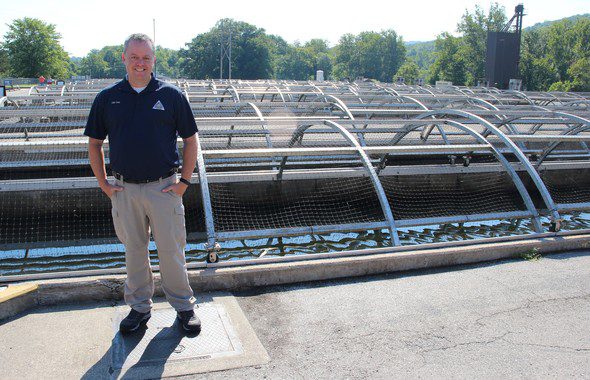
BRANSON, Mo. – Clint Hale has a new job title in a section of the Missouri Department of Conservation (MDC) that he is very familiar with.
As MDC’s Hatcheries Systems Manager, Hale will oversee MDC fish hatchery operations for the entire state. MDC’s hatcheries system consists of five cold-water and four warm-water hatcheries. Hale will be officed at MDC’s Shepherd of the Hills Hatchery near Branson. He replaces James Civiello, who retired earlier this year.
Hale brings two decades of hatchery experience to his current position. A native of Belle who received his bachelor’s degree from College of the Ozarks and a master’s degree from Drury University, Hale began his MDC career in 2002 as a resource aide at Maramec Spring Hatchery. He became assistant hatchery manager at that facility in 2004 and was then promoted to hatchery manager at Shepherd of the Hills in 2008.
MDC’s cold-water and warm-water fish hatcheries add variety to Missouri’s fishing opportunities and also provide great places to visit. The state’s five cold-water hatcheries (Bennett Spring near Lebanon, Roaring River near Cassville, Montauk near Salem, Maramec Spring near St. James, Shepherd of the Hills near Branson) raise rainbow trout and brown trout that are released at Missouri trout parks and at trout management areas across the state.
MDC’s four warm-water hatcheries (Lost Valley near Warsaw, Chesapeake near Mount Vernon, Blind Pony near Sweet Springs, and Hunnewell in Shelby County) provide a variety of sportfish that add diversity to Missouri’s fishing opportunities. In addition to producing popular species like walleye and channel catfish that are used to enhance natural-reproducing populations at reservoirs throughout the state, some of MDC’s warm-water sites also produce paddlefish, muskie, and pallid sturgeon.
“Hatcheries are full of opportunities and I’m excited to play a greater role in providing fish that Missourians can enjoy,” Hale said.
The fish MDC hatcheries produce provide countless recreational opportunities for Missouri anglers and pump millions of dollars annually into the state’s economy because of the revenue-producing opportunities they provide (meals, hotels, etc.) and the jobs that are created/supported because of these activities.
Hale can be reached at [email protected]. More about MDC hatcheries can be found at https://mdc.mo.gov/discover-nature/places/fish-hatcheries.















